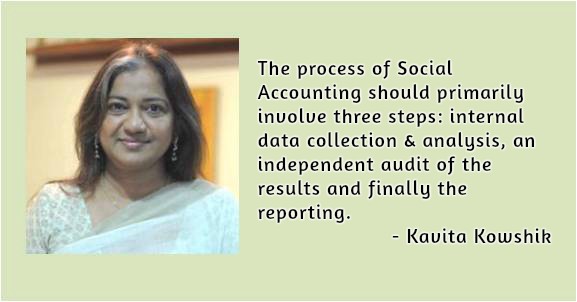Social Accounting can be a successful tool for CSR
With increasing awareness of CSR, organisational success is measured not only by its financial performance but also by its social and environmental impact.
The Social Accounting concept, that has been gaining in importance, has been recognised as one of the key elements of “good practice” in CSR. Interest in this concept has grown both in large corporations and voluntary organisations too.
When Corporations create ‘Foundations,’ or when they take up focused CSR work, their objectives become similar to that of a voluntary organisation. So, for the purpose of this Opinion piece, I will refer to Corporations doing CSR and Voluntary Organisations, as – ‘organisations’.
The primary objective of development organisations is to achieve social, economical and community benefit. Although financial sustainability is essential to achieve these objectives, it is still of secondary concern. The organisation and all its stakeholders need to know if its objectives are being met; if it is living up to its values and to ensure that those objectives and values remain relevant and appropriate.
Social Accounting facilitates the CSR process
Social Accounting can be defined as a way of demonstrating the extent to which an organisation is meeting its stated social or ethical goals. It touches on the effect an organisation has on society and its relationships with all stakeholders. It enables the organisation to be accountable to its stakeholders; and is also a management tool to improve organisational performance.
Further, social accounting is a framework that allows an organisation to build on existing documentation and reporting, develop a process whereby it can account for its social performance, report on that performance, draw up an action plan to improve performance, understand its impact on the community and be accountable to stakeholders.
Each organisation may have its own reasons for adopting Social Accounting like: it helps in improving financial performance, brings out clearly the link between improved social performance and improved financial performance, helps in enhancing relationships with stakeholders and in managing risk; helps in establishing clear alignment in strategy and operations with aims and values and in specifying the organisation’s boundaries of responsibility.
Other reasons for voluntary organisations are: it brings into focus critical aspects of accountability in a positive, innovative manner and increases transparency, which enhances the organisation’s reputation for practicing its values; it provides a comprehensive feed-back from stakeholders, thereby, focusing the management’s attention on the outcomes and how to respond; it also highlights the stakeholders’ view of the organisation, and is a voluntary, participatory process.
The process of Social Accounting should primarily involve three steps: internal data collection and analysis, an independent audit of the results and reporting (for disseminating the outcome). A process that stops short of auditing and dissemination is termed a “Social Review”.
Social accounting provides a comprehensive framework for proper accounting, auditing and reporting against an organisation’s social objectives. But, “doing social accounting” alone is not adequate. It is the framework into which impact assessment information can be placed. The process is viewed as a good move towards social impact assessment. For many organisations involved in community development, social objectives have often been a driving force; many of them have struggled to collect information amounting to a social impact assessment, in order to legitimise their existence – primarily to donors, or the public at large or Governments, if not themselves.
An integral part of Social Accounting and Audit is an SROI analysis – a process of understanding, measuring and reporting on the social, environmental and economic value that an organisation creates.
Simply put, the SROI process involves dialogue with stakeholders to identify what social value means to them, understanding how that value is created through a set of activities, finding appropriate indicators, or ‘ways of knowing’ that change has taken place, putting financial proxies on those indicators that do not lend themselves to monetisation and comparing the financial value of the social change created to the financial cost of producing these changes






Be the first to comment on "Make your CSR a movement!"